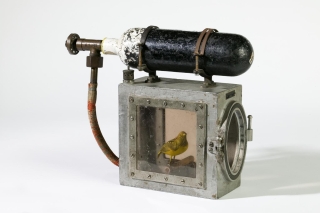
Canaries in the Coal Mine: Industry Partnerships in the Culinary Arts Classroom Point Toward a Greater Problem
06 January 2025A practical and research-based analysis of culinary education’s challenging partnership with the foodservice industry.
By Lisa Parrish, GMC Editor, and
Christopher Bates, MEd, CCC, CCE, NPE
Feedback & comments: This email address is being protected from spambots. You need JavaScript enabled to view it.
In the late 1800s, coal miners devised a remarkable early warning system: canaries, carried into mining caverns far below the surface, in specially designed cages outfitted with oxygen tanks. If the environment turned dangerous, the bird would be the first to become sick from carbon monoxide poisoning, the miners would switch on the oxygen to save the bird, and the workers would flee the killing gas and find safety above. “Canary in the coal mine” is a phrase now associated with any early warning, an expression forewarning of impending threat or failure.
What if the “canary” of contemporary culinary education is the relationship between education and the foodservice industry? Is the bird (or relationship) sick? Or, as Christopher Bates, 2024 CAFÉ and IPC Secondary Educator of the Year recipient, suggests, does the bird already lie unmoving at the bottom of the cage, the threat already upon us, the danger very real?
Chef Bates lives and works near the tourism capital of the United States and one of the top 50 destination cities in the world – Orlando. He has a unique, close-up view of how culinary students enter foodservice after graduation and either leave the industry altogether, which is the most common outcome, or accept a series of low-paying, entry-level positions, receiving new training that has little to do with the classes they took during their formal education.
The Program Director of Magnet Academy of Culinary Arts in Apopka, Fla., Chef Bates has worked doggedly to incorporate industry partnerships in his classroom and find roles for industry leaders on his Advisory Board. Unfortunately, the results have not always been stellar. He tells of a potential-filled partnership, three years in the making with a nearby four-star hotel and executive chef. He describes the partner’s readiness to engage with his students both financially and personally, all to have it fall apart at the last minute. Building on personal experience, Bates shares the research on how effective school/work partnerships spell the difference between lackluster outcomes and powerful student opportunities. However, creating these partnerships is increasingly difficult in the current environment.
Chef Bates has authored several practical research articles for the Gold Medal Classroom, essays expanding on the current gas-filled coalmine environment that is culinary education’s relationship with the industry. In his first article, “Industry partnerships in the culinary arts classroom point toward a greater problem,” he highlights two industry misconceptions:
- The purpose of work/school partnerships is so businesses can gain entry-level employees.
- Companies are typically happy to give talks, host field trips and visit campuses – low investment activities that require little on their part. They think this is what educators want. (But, what educators really need are mentors, supplies, financial support and equipment.)
Bates’ most challenging remarks are saved for the professional educators themselves. He addresses what he sees as the great misconception of the culinary education system itself:
- Few culinary schools are preparing students to be the line cooks, sous chefs and competent culinary workers the industry needs on day one.
This article applies current research, interpreted through the lens of Bates' 25 years as a working chef and restaurant executive and 10 years as a chef instructor and program director. His article is a stark warning: the canary of industry partnerships is a harbinger of increasing irrelevance.
He points to numerous reports demonstrating those responsible for hiring culinary talent have lost much of their respect for culinary education. For this reason, there are increasing numbers of restaurant executives who see investing time and resources into any culinary classroom as an exceptionally low return on investment. Chef Bates writes, “The skills, values, and work habits our partners want new employees to have are not the skills, values, and work habits we are teaching. This is a fundamental fact, underscored by a significant quantity of research.”
Few culinary professionals beyond the culinary education bubble believe beginning cooks should spend two to four years and significant money on attending a formal culinary school. A strong proponent of formal culinary education, Chef Bates strenuously disagrees with this viewpoint. However, he believes culinary educators must understand why the public isn’t buying “what we’re selling.”
You see, the canary was never meant to die and would be saved by the oxygen tank. In this first article, Chef Bates points to the unmoving canary, but he is also eager to join fellow culinary educators in turning the tide (and the oxygen valve).
“We NEED to make aggressive and deep changes to our institutional model. I believe we must make these changes to continue to exist at all. There is a mountain to move and our first task is simply to acknowledge the mountain is there,” he writes. “Once that incredibly basic hurdle is crossed, we can begin to rethink on a fundamental level what we are attempting to accomplish and the first step in that direction. Oddly enough, the very thing that points to our problem – effective industry partnerships – is the key to becoming relevant again.”
Click here to read the full article:
“Industry partnerships in the culinary arts classroom point toward a greater problem,” by Chef Christpher Bates.
Chef Christpher Bates earned the Orange County Public Schools Teacher of the Year in 2020, was selected as ProStart Florida Teacher of Excellence in 2023, and received the James H Maynard National Award for Classroom Innovation in 2023.
Photo courtesy of Science Museum Group © The Board of Trustees of the Science Museum.
